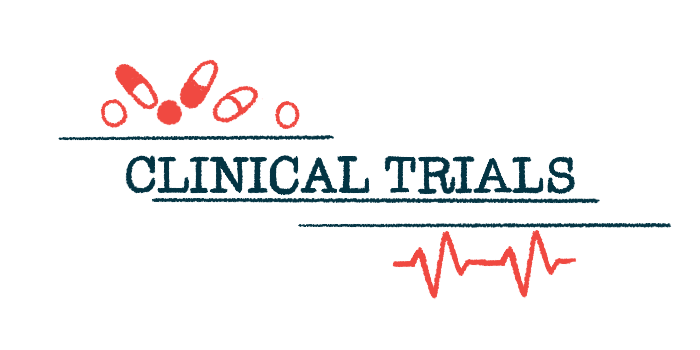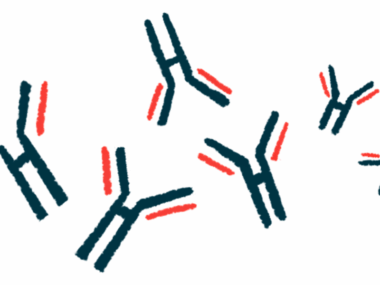Therapeutic Parkinson’s vaccine safely inhibits alpha-synuclein
Twelve of 13 patients who completed dosing developed blood antibodies
Written by |

UB-312, a therapeutic vaccine candidate from Vaxxinity, safely led to antibodies being produced that could target toxic clumps of the alpha-synuclein protein in people with Parkinson’s disease, according to final published data from a Phase 1 clinical trial.
Having detectable antibody levels against alpha-synuclein in the cerebrospinal fluid (CSF) was associated with greater reductions in alpha-synuclein and improvements in being able to perform daily motor activities. CSF surrounds the brain and spinal cord.
“The publication of this data … immortalizes the profound impact of UB-312, leading the charge against the very core of Parkinson’s,” Lou Reese, Vaxxinity co-founder and executive chairman, said in a company press release. “This is more than just a scientific breakthrough; it’s a battle cry for change, declaring that the status quo in Parkinson’s care is no longer acceptable.”
The study, “Target engagement and immunogenicity of an active immunotherapeutic targeting pathological α-synuclein: a phase 1 placebo-controlled trial,” was published in Nature Medicine. The research was funded by Vaxxinity with support from The Michael J. Fox Foundation.
In Parkinson’s disease, alpha-synuclein forms toxic clumps, or aggregates, that damage nerve cells. This is believed to contribute to neurodegeneration and its associated symptoms.
UB-312 is designed to stimulate the immune system to target and destroy harmful forms of alpha-synuclein. By addressing this key disease mechanism, the experimental vaccine would slow or stop Parkinson’s progression. The Phase 1 clinical trial (NCT04075318) was set up to test its safety and effectiveness at various dosing regimens in healthy volunteers and Parkinson’s patients.
Developing antibodies against alpha-synuclein
In its first part with 50 healthy volunteers the vaccine was well tolerated at doses up to 300 micrograms (mcg) given three times and led to detectable antibodies developing against alpha-synuclein.
Here, in the second part, 20 patients with early Parkinson’s disease were dosed with either of two UB-312 regimens, or a placebo, and were followed for 45 weeks, or a little under a year.
A course of three injections were given into the muscle at weeks 1, 5, and 13. Those given UB-312 received a 300 mcg dose as the first injection, followed by either two 100 mcg doses or two more 300 mcg doses.
The vaccination led to robust and time-dependent increases in antibodies against alpha-synuclein. Twelve of 13 Parkinson’s patients who completed dosing in the trial developed antibodies in the blood, and for five people those antibodies were also detectable in the CSF.
The treatment preferentially targeted alpha-synuclein clumps and slowed its aggregation, lab studies showed. Both UB-312 doses led to reductions in alpha-synuclein clumps in the CSF relative to the placebo and a significant difference was observed in the 300/100/100 mcg dosing group.
Moreover, the patients who had detectable UB-312-induced antibodies in the CSF had significantly more pronounced reductions in alpha-synuclein clumps and phosphorylated alpha-synuclein, a toxic version of the protein, over those who didn’t.
There were no overall differences between treatment groups regarding motor function, as assessed by the Movement Disorder Society-Unified Parkinson’s Disease Rating Scale (MDS-UPDRS). But the patients with detectable CSF antibodies showed a significant improvement in scores on the MDS-UPDRS Part II, reflecting gains in daily motor activities, relative to those without detectable antibodies.
The treatment was well tolerated and most side effects were mild and temporary. The most common ones included headache, local pain after CSF collection, and fatigue.
“Together, these data support continued development of UB-312 as a disease-modifying treatment for PD [Parkinson’s disease],” the researchers wrote.
Earlier this year, Vaxxinity entered into a research collaboration with the University of Florida to advance the development of vaccines for neurodegenerative diseases, including UB-312.
“UB-312 has the potential to become an important and potent disease-modifying therapy for Parkinson’s disease,” said Geert Jan Groeneveld, MD, PhD, a neurologist and principal investigator of the trial. “It would be truly amazing if we could vaccinate people against Parkinson’s disease in the future!”



